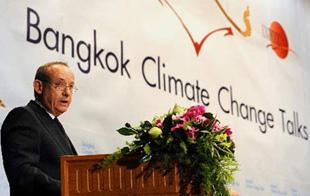World
Climate Change talks eye deep emission cut by industrialized countries
Source: Xinhua | 04-02-2008 08:17
BANGKOK, April 1 (Xinhua) -- Defining actions to deep emissions cut by industrialized countries will be the central issue to be addressed in a new round of UN-sponsored climate change negotiations, started with the five-day Bangkok Talks March 31-April 4, said the United Nations' top official on climate change on Tuesday.
 |
| Yvo de Boer, Executive Secretary of the United Nations Framework Convention on Climate Change (UNFCCC) secretariat, gives a speech at a news conference on April 1, the second day of the Bangkok talks. (Xinhua/AFP Photo) |
"Central to a successful Copenhagen agreement is clearly going to the deep emission cut by the industrialized countries, which are the main one responsible for the problem, and the one the developing countries are looking to show leadership," said Yvo de Boer, Executive Secretary of the United Nations Framework Convention on Climate Change (UNFCCC) secretariat, at a news conference here Tuesday, the second day of the Bangkok talks.
Some 2,000 delegates from governments and NGOs of 163 countries are attending the Bangkok talks, which opened on Monday, kicking off a fresh round of international negotiations after Parties to the UNFCCC agreed after difficult bargaining last December in Bali, Indonesia, on a road map for strengthening international action on climate change.
The new complex agreement, expected to be reached in Copenhagen Climate Change Conference in late 2009 in Denmark, will have one of its focus on defining further technical and financing support and assistance by the developed countries for developing countries in climate change mitigation and adaptation.
A number of different options for resourcing fund for global cooperative efforts are being discussed, said de Boer. Among them, China has suggested that the developed countries devote 0.5 percent of their GDP a year to help developing nations combat climate change, while Germany proposed auctioning a portion of emission rights and using the proceeds for international cooperation on climate change mitigation and adaptation.
Some attending UN officials said the Bangkok talks will prove easier in terms of atmosphere than the Bali conference, as it is just start of negotiations based on the just drafted Bali Road Map(BRM), on the way towards a new global cooperation strategy for combating climate change after the first commitment period of Kyoto Protocol expires by the end of 2012, and supposedly more technical-oriented.



